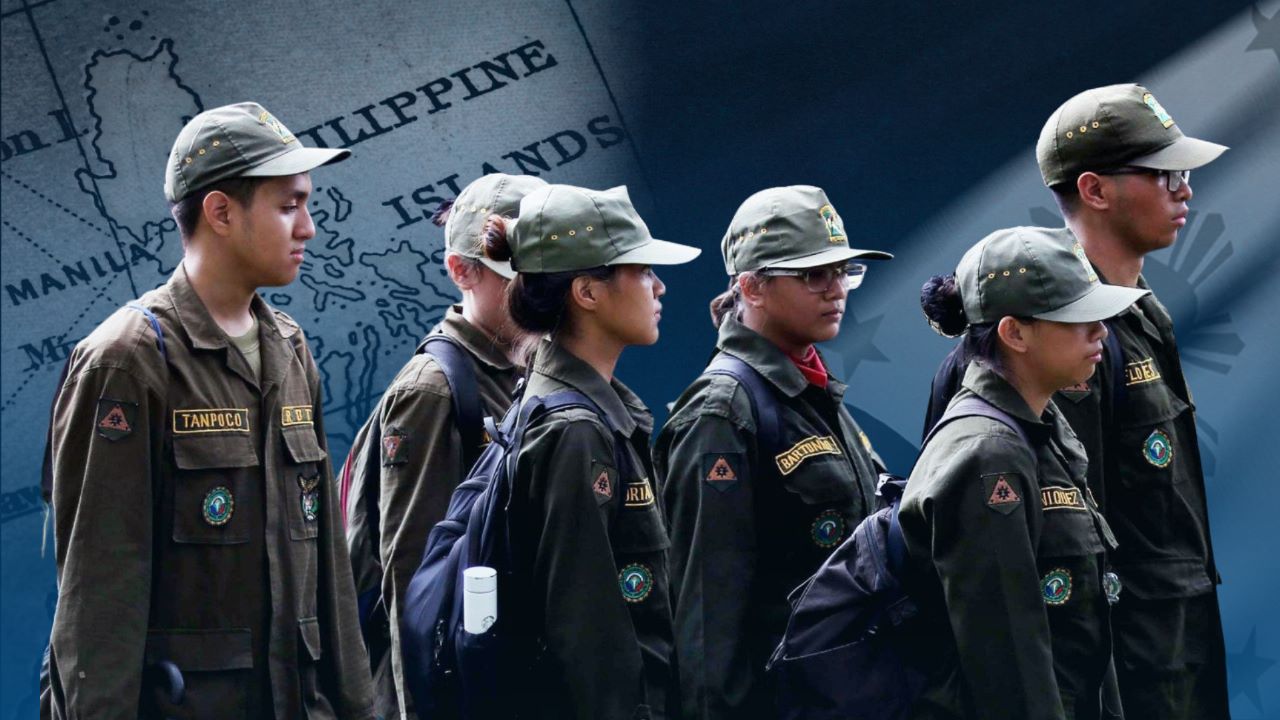MANILA, Philippines—The Reserve Officers’ Training Corps (ROTC) was made optional because of the outcry against violence and corruption, and based on a survey by the Catholic Educational Association of the Philippines (CEAP), it is still one of the reasons that many oppose the proposal to make ROTC mandatory again.
Based on data from CEAP, which surveyed 20,461 students – 7,576 (Grade 11), 6,719 (Grade 12) and 6,166 (college) – from its member schools, 53 percent disagreed with proposals to revive the school-based military training program. Some 28 percent agreed, while 19 percent were not certain of their view.
READ: Most Catholic school students oppose ROTC
This is in contrast to the result of the Pulse Asia survey that was commissioned by Sen. Sherwin Gatchalian, who pointed out that 78 percent of adult Filipinos agreed to make ROTC mandatory in college. Only 13 percent disagreed, while 8 percent were undecided.
However, while Gatchalian stressed that it is a clear indication that Filipinos support the proposal to make the program mandatory again, it was not clear how many of the respondents were students or of college age—the reason Sen. Risa Hontiveros asked: Did it capture the sentiment of the youth?
READ: Hontiveros questions poll on mandatory ROTC: Does it capture the sentiment of youth?
CEAP, an organization of over 1,500 Catholic schools, said 34 percent of those who are against the revival of ROTC believe the threat of violence and corruption is concerning.
The most common reason, though, which was cited by 54 percent of the respondents, was the belief that the program will be an added burden to students.
Out of the 28 percent who agreed to make ROTC mandatory again, CEAP said 68 percent had this reason—wanting to learn basic military training, physical exercise, disaster preparedness, and civic engagement. Some 46 percent, meanwhile, believe that the program will teach students patriotism and nationalism.
‘Unpatriotic’
But Sen. Ronald Dela Rosa, a staunch advocate of the bid to revive mandatory ROTC, said there is nothing to worry about even if CEAP said most of its students are against ROTC, pointing this out: “Defending this country is not a matter of choice. It is a constitutional duty of every citizen of this Republic.”
“There is no need of convincing these unpatriotic Filipinos,” he said.
READ: Catholic students oppose mandatory ROTC? No need to convince ‘unpatriotic Filipinos,’ says Bato
However, Rep. Raoul Manuel (Kabataan) told INQUIRER.net in a phone call that when one wants to promote patriotism, a school-based military training program is “not the best and only solution,” saying that “we should instill civic responsibility and active participation instead.”
Back in 2002, Republic Act No. 9163 or the National Service Training Program (NSTP) Act of 2001 was signed into law.
This made ROTC an optional component program, allowing students in college to choose between it, Literacy Training Service, and Civic Welfare Training Service.
“Like us in the Makabayan bloc, we filed an expanded NSTP bill, so that if the government wants to instill disaster preparedness, it can be an additional track in the NSTP program,” Manuel said, referring to President Ferdinand Marcos Jr.’s statement last year that making ROTC mandatory will boost the country’s disaster response.
RELATED STORY: Youths push for expanding NSTP instead reviving mandatory ROTC
“There are bills, too, to promote disaster preparedness, agriculture, labor education, history, and study of laws and ethics among the youth. All of this is a great jumpstart to achieve all our objectives without making ROTC mandatory in college,” Manuel, former president of the National Union of Students of the Philippines, said.
Last year, the House of Representatives passed a consolidation of 28 bills that would establish a two-year mandatory National Citizens Service Training (NCST) program and make the ROTC optional, but critics pointed out that it was essentially just a renamed ROTC.
House Bill No. 6687, which seeks to repeal the NSTP Act, will require college students to train as cadets for 240 hours, then at the end of the program, the graduating cadets will be enlisted as reservists of the Armed Forces of the Philippines (AFP) through the Citizen Armed Force.
RELATED STORY: Youth groups slam NCSTP-ROTC bill
As previously pointed out by Manuel, despite the denial that the NCST program was primarily intended for military training, it was clear that it is a “preparation for the youth to become citizen-soldiers who could be mobilized by the AFP.”
“Despite mixing other civic duties in the curriculum, it does not erase the fact that military training is part of NCSTP and it is being forced upon students without exception,” he said.
Dark past
Manuel stressed that mandatory ROTC should no longer be revived because “in the first place, we should look back at the reasons that it was made optional—culture of violence, corruption and impunity.”
Looking back, Mark Welson Chua, a University of Santo Tomas (ROTC) student and cadet, was brutally killed in 2001 after he exposed corruption in his school’s military training program. His death was one of the reasons that prompted the government to scrap the mandatory ROTC.
His lifeless and decomposing body was discovered in the Pasig River on March 18, 2001.
Before his death, Chua filed a complaint at the Department of National Defense, saying that there is corruption within the UST-ROTC. This resulted in the dismissal of the school’s ROTC commandant after an investigation.
The previous administration had pointed out the need to revive the mandatory ROTC, with then President Rodrigo Duterte saying that it will promote gallantry, bravery, and spirit of volunteerism.” However, his bid to revive it failed.
Last year, Marcos included in his legislative agenda the revival of ROTC, consistent with the call of Vice President Sara Duterte. The only difference is that Marcos wants it implemented in senior high schools, while Duterte said it is better to have the mandatory ROTC in college.
